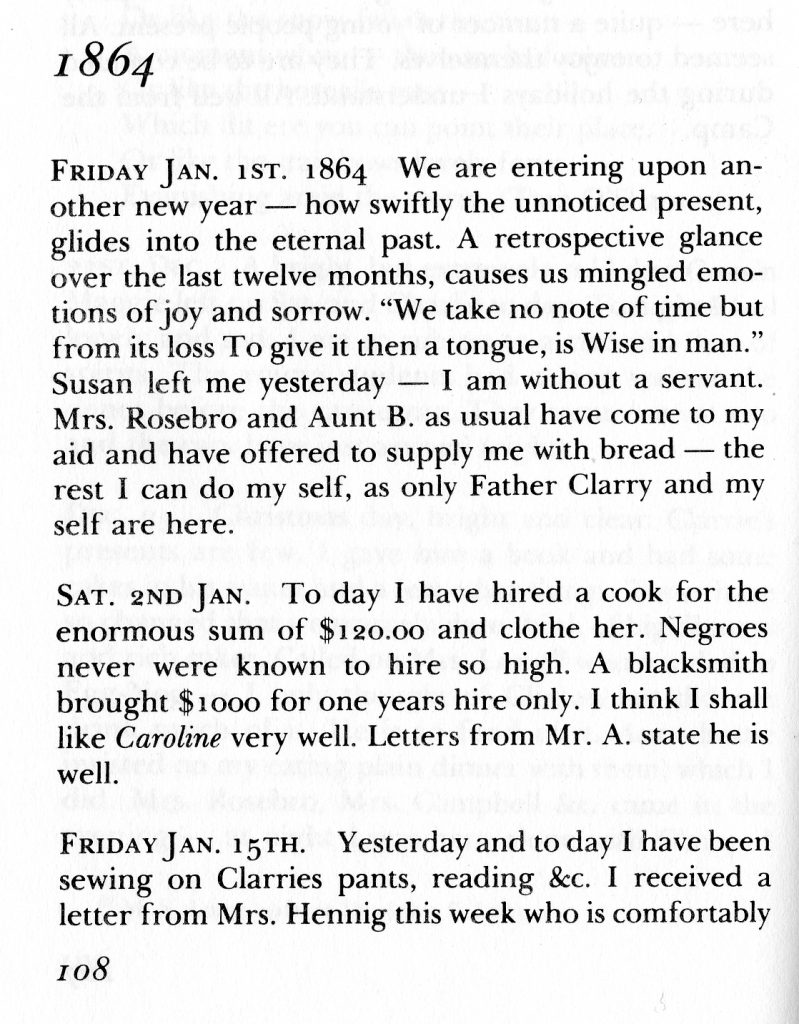In Fall 2019, Archives, Special Collections, & Community (ASCC) had the privilege of working with Dr. Rose Stremlau’s “HIS 306: Women and Gender in U.S. History to 1870” course. Over the course of a semester, students researched the history of women and gender in the greater Davidson, North Carolina area using materials in the Davidson College Archives and other local organizations. The following series of blog posts highlights aspects of their research process.
Addie Turner is a senior History major and Communication Studies minor at Davidson College. She is very interested in women’s history and is currently writing her capstone paper on Planned Parenthood during World War II.
To many, diaries are books filled with an individual’s mundane recordings of his or her life. While they may be mundane, the mundane can lead historians to discover patterns, trends, and a deeper understanding on the social history of a group and the everyday lives of individuals. Ellie’s Book, a now published journal written by Ellie M. Andrews from January 1862 to May 1865, is filled with entries about what most would view as mundane. However, through her notes, we can piece together what life was like for a white middle class woman living in North Carolina during the Civil War. Specifically, I can understand more about food and food preparation during this time period through Ellie’s records.
Ellie’s journal mentions food and food preparation in several entries. On several occasions, she mentions food she produces herself, or with the help of her slave, Susan: “On my return Susan informed me I had another young brood of chickens.”1 She goes on to explain how proud she is to produce her own poultry, especially since the prices of chicken and eggs were rising rapidly. On another occasion she mentions food she has at special dinners, like turkey, ham, cakes, jellies, and more. Her choice of mentioning certain meals and the lists of food that she included in the entries signals the importance of celebratory occasions. Large meals with a wide variety of food was a way to celebrate holidays, visits from friends and family, and other special moments in her life.

Another instance in which she mentions food and cooking is in an entry where she is looking to find a cook. She complains about having to hire a black cook for an “enormous sum of $120.00 and clothe her.”2 It is not clear why she hired a cook or how long she kept her on for. In this entry, readers can understand that Ellie did not want to pay her black cook much money, and that she did not believe that the woman deserved as much money as she required. It is also unclear whether this woman was enslaved or free, so it is hard to determine whether the paycheck went directly to the cook or her owner. This entry suggests that black women were often the ones doing the cooking in white women’s homes, and that white women did not want to pay them much or at all for their work.
Ellie’s journal, while filled with entries recapping her day to day life, informs my research about food preparation in the antebellum and Civil War south. As food preparation was a daily activity for many women, looking to sources like diaries can provide insightful information into what cuisine and cooking looked like at this time.
1 Ellie’s Book: Being the Journal Kepy by Ellie M. Andres from January 1862 through May 1865, Transcribed and Annotated by Ann Campbell MacBryde. Entry from 10 unknown month, 1863.
2 Ellie’s Book: Being the Journal Kepy by Ellie M. Andres from January 1862 through May 1865, Transcribed and Annotated by Ann Campbell MacBryde. Entry from 2 January, 1864.

Speak Your Mind